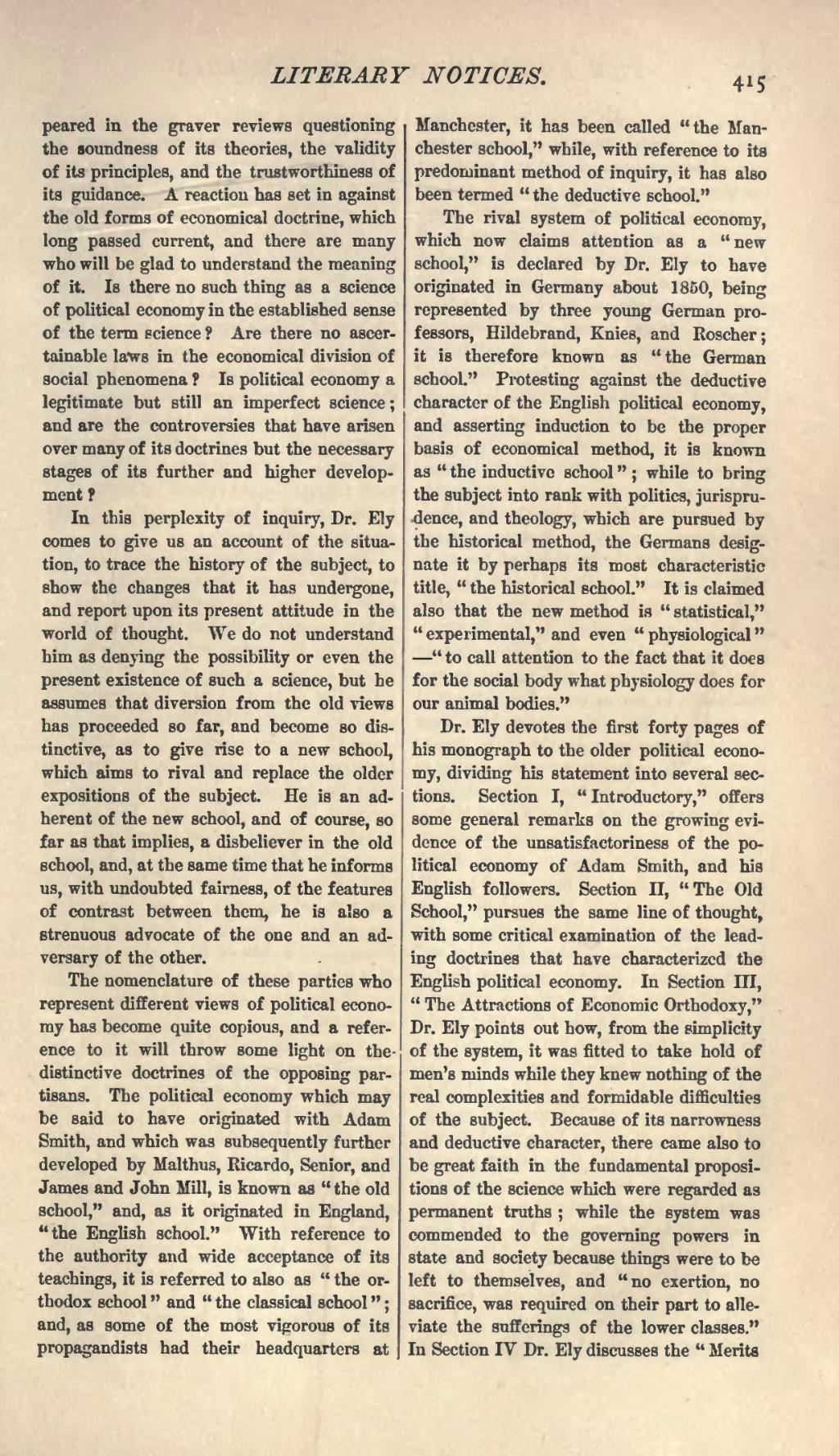peared in the graver reviews questioning the soundness of its theories, the validity of its principles, and the trustworthiness of its guidance. A reaction has set in against the old forms of economical doctrine, which long passed current, and there are many who will be glad to understand the meaning of it. Is there no such thing as a science of political economy in the established sense of the term science? Are there no ascertainable laws in the economical division of social phenomena? Is political economy a legitimate but still an imperfect science; and are the controversies that have arisen over many of its doctrines but the necessary stages of its further and higher development?
In this perplexity of inquiry, Dr. Ely comes to give us an account of the situation, to trace the history of the subject, to show the changes that it has undergone, and report upon its present attitude in the world of thought. "We do not understand him as denying the possibility or even the present existence of such a science, but he assumes that diversion from the old views has proceeded so far, and become so distinctive, as to give rise to a new school, which aims to rival and replace the older expositions of the subject. He is an adherent of the new school, and of course, so far as that implies, a disbeliever in the old school, and, at the same time that he informs us, with undoubted fairness, of the features of contrast between them, he is also a strenuous advocate of the one and an adversary of the other.
The nomenclature of these parties who represent different views of political economy has become quite copious, and a reference to it will throw some light on the distinctive doctrines of the opposing partisans. The political economy which may be said to have originated with Adam Smith, and which was subsequently further developed by Malthus, Ricardo, Senior, and James and John Mill, is known as "the old school," and, as it originated in England, "the English school." With reference to the authority and wide acceptance of its teachings, it is referred to also as "the orthodox school" and "the classical school"; and, as some of the most vigorous of its propagandists had their headquarters at Manchester, it has been called "the Manchester school," while, with reference to its predominant method of inquiry, it has also been termed "the deductive school."
The rival system of political economy, which now claims attention as a "new school," is declared by Dr. Ely to have originated in Germany about 1850, being represented by three young German professors, Hildebrand, Knies, and Roscher; it is therefore known as "the German school." Protesting against the deductive character of the English political economy, and asserting induction to be the proper basis of economical method, it is known as "the inductive school"; while to bring the subject into rank with politics, jurisprudence, and theology, which are pursued by the historical method, the Germans designate it by perhaps its most characteristic title, "the historical school." It is claimed also that the new method is "statistical," "experimental," and even "physiological"—"to call attention to the fact that it does for the social body what physiology does for our animal bodies."
Dr. Ely devotes the first forty pages of his monograph to the older political economy, dividing his statement into several sections. Section I, "Introductory," offers some general remarks on the growing evidence of the unsatisfactoriness of the political economy of Adam Smith, and his English followers. Section II, "The Old School," pursues the same line of thought, with some critical examination of the leading doctrines that have characterized the English poliical economy. In Section III, "The Attractions of Economic Orthodoxy," Dr. Ely points out how, from the simplicity of the system, it was fitted to take hold of men's minds while they knew nothing of the real complexities and formidable difficulties of the subject. Because of its narrowness and deductive character, there came also to be great faith in the fundamental propositions of the science which were regarded as permanent truths; while the system was commended to the governing powers in state and society because things were to be left to themselves, and "no exertion, no sacrifice, was required on their part to alleviate the sufferings of the lower classes." In Section IV Dr. Ely discusses the "Merits

